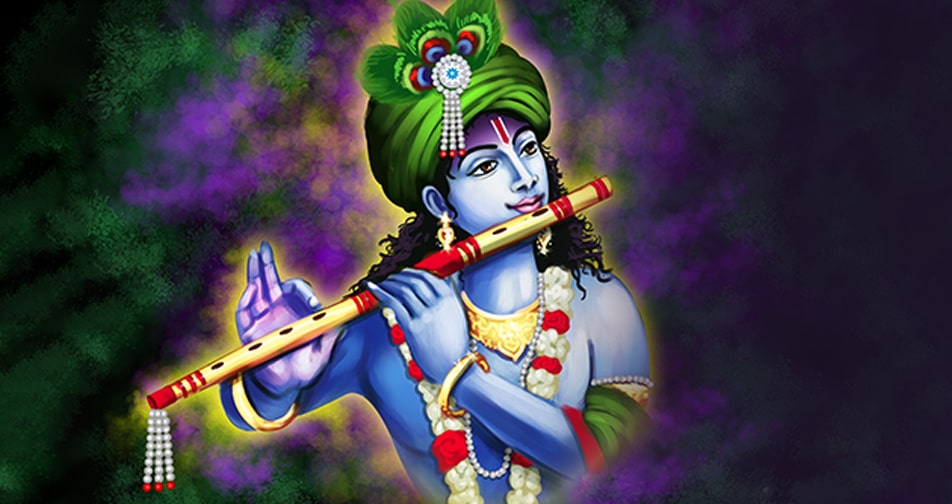Janmashtami, or Krishna Jayanti, is a much-awaited Hindu festival, especially among the Vaishnava community in India and other countries. The festival celebrates the birth anniversary of Lord Krishna, an avatar of Lord Vishnu, who is one of the 3 major gods in Hinduism, along with Shiva and Brahma.
Janmashtami 2024 or Krishna Jayanti 2024 falls on Monday, 26 August. The date varies each year, as per the lunar calendar. It usually falls on the 8th day of Krishna Paksha or the waning lunar phase in Bhadrapada month (August – September).
Midnight prayers, fasting, feasting, Dahi Handi, and cultural performances are part of the colorful Janmashtami celebrations.
Legend behind Janmashtami
Krishna’s Birth
The birth of Krishna is a very gripping tale in itself. He was born exactly at midnight on the auspicious Ashtami (8th day) day of Krishna Paksha in the city of Mathura. Vishnu took birth as Krishna for a purpose. Mathura was ruled by the tyrant Kamsa, who had usurped power after deposing his father. Kamsa was the brother of Devaki, Krishna’s mother. A divine prophecy had foretold that the 8th child of Devaki would kill Kamsa. So, he imprisoned his sister and her husband, Vasudeva, and killed their children as soon as they were born. However, Vasudeva was able to save Krishna from Kamsa’s clutches thanks to divine intervention. Krishna was raised by Nanda and Yashoda in Gokul. Kamsa sent many demons to kill Krishna, but they were all killed by Krishna. When Krishna became a young man, he went to Mathura and fulfilled his divine mission by slaying Kamsa. Thus, he put an end to tyranny and restored Dharma
Janmashtami is, therefore, a reminder that evil will perish and good will ultimately prevail.

Janmashtami Celebrations in India
Krishna is a much-loved deity, and Janmashtami is celebrated with great zeal all over India. Each region celebrates the festival in a unique way.
In North India, people enact ‘Raas Leela.’ This is a dramatization of incidents from Krishna’s life. In South India, devotees decorate their homes with rangolis or kolams and make many sweet dishes.
Devotees visit Krishna temples chanting ‘Hare Krishna’ with joy and devotion and offer prayers. They also sing Bhajans and hymns in praise of Krishna.
In West India, especially in Maharashtra, ‘Dahi Handi’ events take place. It is a competition in which different teams try to break a pot filled with buttermilk/curd suspended at a height.
This tradition aims to reenact the child Krishna’s attempt to steal butter, which he loved. In the East, people observe a fast. This is followed by feasting, with people indulging in different kinds of milk-based sweets.
Significance of Janmashtami
Janmashtami celebrates the universal principles embodied by Krishna.
It reminds us of the importance of leading a righteous life, as Adharma can invite the wrath of God. It is also an opportunity to celebrate our faith and devotion by remembering Krishna’s teachings and applying them in day-to-day life.
Krishna’s birth brought joy and eliminated ignorance and darkness. We can always seek refuge in God during tough times. He always comes to the rescue of his devotees.
Chanting, meditation, and reading the Scriptures are some of the spiritual practices one can follow on Janmashtami to connect with Krishna.
It is also an occasion that fosters unity, as the entire community takes part in the celebrations.
Janmashtami Celebrations and Rituals
Krishna, according to mythology, was born at the stroke of midnight. So people stay awake throughout the night to celebrate the festival.
Many devotees visit temples to offer prayers. They sing Bhajans and hymns to celebrate the divine birth. The temples wear a festive look, and are usually decorated with lights and flowers. There will be special Aartis and devotees sing and dance all through the night.
People also observe a day-long fast, which ends at midnight. They do not take food or water during the fast. They end the fast by consuming Prasad, which includes an assortment of vegetarian dishes that Krishna likes.
They include the following items:
- Panchamrit (a mixture of milk, honey, ghee, yogurt, and sugar)
- Fruits
- Dry fruits and nuts
- Sweets like Laddu and Barfi
- Savory items like Chappan Bhog (56 types of food)
Cultural Programs
Janmashtami is also a time for cultural programs. Plays, dance, music, etc., that depict events in Krishna’s life are some of them.They are usually organized by local groups.
Dahi Handi
The Dahi Handi contest is part of the celebrations, and many teams take part in it.
The teams can be formed by young men or women who are called ‘Govindas.’ They climb on each other to form human pyramids and try to reach and smash open a pot (Handi) that is filled with buttermilk. The pot is suspended high above the ground. This tradition replays the pranks of Krishna, who was known for stealing butter in his youth.
This event is an opportunity to display physical agility and teamwork. It also brings the entire community together in joy and harmony.